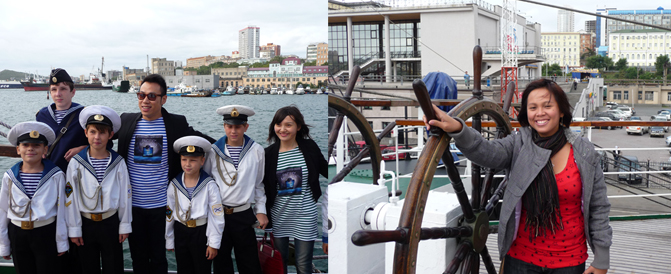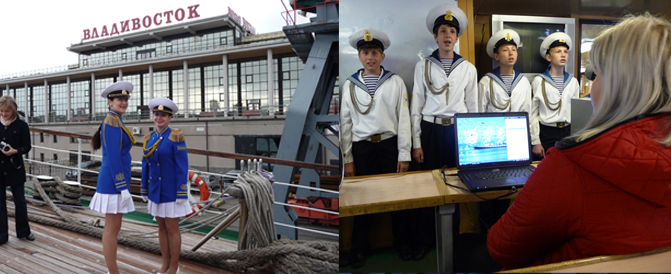IT WAS ON THE GOOD SHIP PALLADA
Having seen Departures at the Ocean Theatre (Not a dry eye in the house. Some of the toughest looking film festival attendees I’ve ever seen had tears in their eyes) and getting to bed around midnight, I was in better shape than some other festival guests (who had been drinking in the hotel’s Sky bar until 6am) for a cruise around Vladivostok’s harbour. The weather looked a tad grim, but these trips act as a good bonding experience for festival guests. I was expecting a small boat. Instead down at the dock, the good ship Pallada turned out to be a full tall mast ship.
Looking down on the guests from the starboard side was a full crew, and sailors aged from about 12 (probably from a local school) all the way up to seasoned salts who’ve probably been to more ports than I’ve been to festivals. There were also a couple of “sailors” whose purpose was decorative, but I didn’t hear anyone – even the other sailors – complain.
Tug boats adjoined the Pallada and escorted the ship out until the sails were unfurled and our cruise around the Vladivostok harbour had truly begun. With sunshine making a victory over the grim clouds we got a smooth run around – except for a brief stint when the ship passed by the headlands that protect the bay from open sea.
The skyline of course was impressive, but part of what was also shown was the land where some of the infrastructure for the impending APEC conference will take place (land has been cleared but not much actual construction) and the beginnings of the proposed bridge to Russki island.
After a couple of hours we ushered downstairs where a sailor boy choir sang about half a dozen songs of apparently patriotic nature. Russians and international guests alike joined in rhythmic handclapping (like John Wayne said of the Russians in Joseph Von Sternberg’s Jet Pilot: “they sang my songs and I sang theirs”) and when the show was over, we directed to the galley to eat a vegetable soup and sauceless pasta and meat. The tour finished about four hours after we set off. As the tugs rejoined the Pallada to guide it to dock, a small cannon was let off. Once, twice, three times with a deafening bang that gave the car alarms at the dock’s car park something to sing about.


WHAT’S A FILM FESTIVAL FOR?
When I first started working as a critic I would have said that the purpose of a festival was to watch films. And readers of the above passage may well think that I have actually forgotten that mission. But attending Vladivostok I am reminded of some things I have learned by watching the rise and rise of the Pusan International Film Festival since my first trip there in 1999.
Both festivals – Vladivostok and Pusan – have similar beginnings. They are hospitable and fun-filled affairs that from the start have had government endorsement. For South Korea, it is plain that PIFF was not only about taking Korean films to the world, but part of a wider government strategy that commenced with the 1988 Seoul Olympics. Since then Busan has not only the film festival, but has participated in the Asian Games, The World Cup Soccer, the APEC conference. Each event has signalled the country as not only as a tourist destination, but as a pronouncement that the country is open for business.
In comparison with Vladivostok, the APEC (Asia Pacific Economic Cooperation) is key. With the conference in 2012, Russia will be putting its best face to the world. Admittedly, the town still needs a lick of paint applied to some of its grander buildings. But there is a clear political will (remember the Governor is also the honorary head of VIFF) to improve – and more importantly promote this city. The festival with its deliberate decision to focus on the “Pacific Meridian” and surrounding Asian countries is clearly part of that. Like Pusan in 1999, there is political support, substantial financial support (one of the sponsors of VIFF this year is the construction company that is building the bridge to Russki island I mentioned earlier) and an ambition to be part of the international community – in trade as well as arts. If it is well managed, it seems to me that VIFF is in a solid position to duplicate PIFF’s history not only as a film-making hub, but as a flagship of a wider program. Helping that of course would be the presence of a break-out Russian film, preferably from the Vladivostok region.
